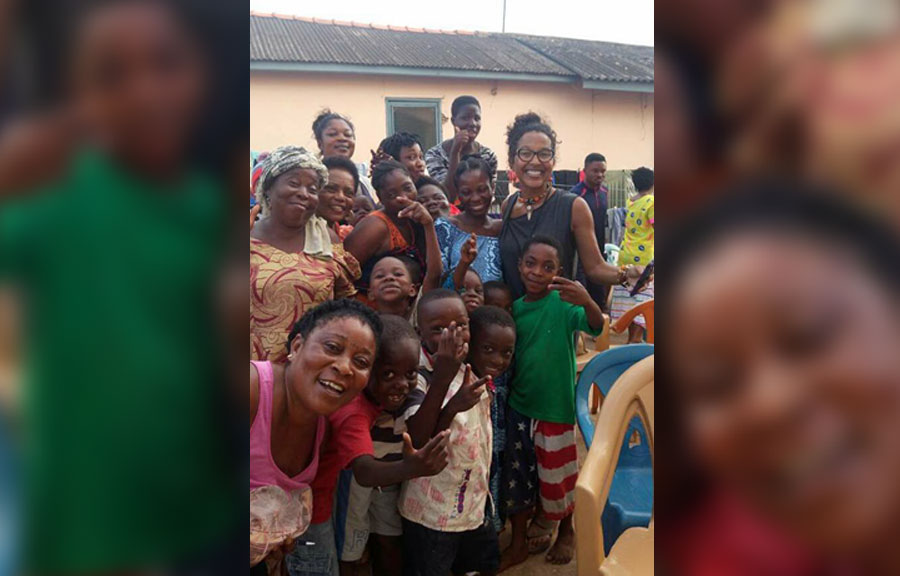
By Jennifer White, Voice & Viewpoint Contributing Writer
Photos: Planet Green Recycle
Many African-Americans long to make a pilgrimage to Africa, their ancestral homeland, affectionately called the “Motherland”. Black Panther’s “Wakanda” only magnified that desire. In May of 2018, SISTERcircle initiated a monthly discussion series entitled “How To Get To Africa 101” to share stories about where Black San Diegans traveled in Africa (or wanted to), dispel myths, discuss strengths and challenges of being in the Motherland, as well as barriers that prevent travel there. While many people had already been to Africa (and were hooked!), most had a burning desire to go — but lacked the financial resources, social support, and connections in Africa to make it happen. All loved talking about it (at length!), and were interested in working together so more Black folks from Southeast San Diego could travel to the Motherland.
And, the “Recycle for Africa” Campaign was born.
SISTERcircle’s Recycle For Africa Campaign collects old cell phones, tablets, plastic bottles and cans to raise funds to send 5 women and 5 youth to Ghana every year for the next 10 years. To facilitate meaningful cultural exchange, a collaborative healing art project to “connect, heal, and empower” women between Southeast San Diego and Tema, Ghana, two official “Sister Cities”, will be directed by local artist Kim Phillips Pea, a proud graduate of San Diego’s School for Creative and Performing Arts when it was located in its original venue in the heart of the Southeast San Diego.
While traveling abroad to Africa costs between $3,000 and $5,000, financial constraints are the primary obstacle. The benefits of recycling were discussed as a potential solution that could not only help women and youth get to Africa, but would serve the City of San Diego by reducing greenhouse gas emissions — a primary goal of San DIego’s Climate Action Plan, endorsed by Mayor Faulkner, to cut greenhouse gas emissions in half by 2035.
But, that is not all. Additional benefits were explored and created by partnering with 3 local recycling businesses rooted in the heart of the 4th and 8th Districts. These facilities have relationships with the local community, as they have been doing business in Southeast San Diego for over 20 years. They have a commitment to the community, and a vested interest in seeing it thrive. As such, they want to upgrade their sites to develop state-of-the-art processing and manufacturing facilities that can provide STEAM education for youth, and much needed social services for homeless veterans, who tend to be among the most frequent recyclers (we know, because they are part of our families).
By simply RECYCLING old cell phones and electronics, plastic bottles and cans, SISTERcircle works collectively with individuals and organizations across the country to send people to Africa, reduce greenhouse gas, serve youth and assist veterans. In partnership with Planet Green Recycling, now anyone in the US can donate their used small electronics free and easy by simply printing out a free shipping label, collecting items in an old box, and setting the box out for the post office for pick up. Easy peazy!
Recycling processing center cost over $1 million to build, so how will all these efforts be funded? Great question! The Recycle For Africa Campaign will tap into the billions of dollars available from the CA Dept of Energy’s annual “cap & trade” funding that is specifically designated for “Communities of Concern” (aka disadvantaged/ low-Income/ under-resourced neighborhoods). Cap & trade is a system being piloted in California for controlling carbon emissions and other forms of atmospheric pollution by which an upper limit is set on the amount a given business or other organization may produce but which allows further capacity to be bought from other organizations that have not used their full allowance. Annual proceeds from cap & trade go into the “California Climate Investments” fund to be used to reduce greenhouse gas emissions.
Why? Because Communities of Concern like Southeast San Diego suffer disproportionately from the effects of pollution that negatively impact air quality and water quality. The result of these inequalities has repercussions on the physical, mental, socio-economic and overall health of Communities of Concern.
Thanks to Assembly Bill 1550 (Gomez, 2016), twenty-five percent (25%) of all cap & trade funds are specifically targeted to Communities of Concern and go into a fund annually known as California Climate Investments. These funds are aimed at improving public health, quality of life and economic opportunity in California’s most burdened communities at the same time they’re reducing pollution that causes climate change.
Unfortunately, these funds go hugely untapped by the intended recipients – low income individuals and families for whom it is earmarked. It is typically utilized by big developers building for-profit businesses and taking more resources OUT of Communities of Concern.
Recycling is a win-win situation. It can generate money for the recycler (remember crushing cans as a youth for extra money?) and when in done purposefully in concert with others, produces amplified results. Recycling is also good for the environment. Recycling not only reduces energy consumption on a global scale, it decreases pollution, slows the rate of resource depletion, and contributes to fighting global warming.
To support the Recycle For Africa Campaign, register as an EnviroFriend at https://planetgreenrecycle.com/fundraising/?purl=recycleforafrica, and DROP OFF old plastic bottles, cans and computers at First Saturdays San Diego, 6403 Imperial Avenue, San Diego, CA 92114. Need pickup? Text or call the Recycle For Africa Hotline at (442)288-7347 for weekly free pickup.


